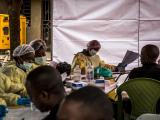Jun 17, 2009
Army lab inventory finds many unrecorded vials of pathogens
Army investigators revealed today that pathogen inventories at the US Army Medical Research of Infectious Diseases (USAMRIID) in Ft. Detrick, Md., turned up 9,200 more vials than records indicated, the Frederick (Md.) News-Post reported. In early February the Army said it was suspending most select-agent work at the lab as part of a security review in the wake of events surrounding the death of former employee Bruce E. Ivins, who federal officials believe was involved in the 2001 anthrax attacks. In its report today, the Army said it searched 335 refrigerators and freezers and found that some of the excess samples were decades old and left over from previous research projects. Some of the vials contained agents that cause anthrax and Ebola infections, as well as Rift Valley fever. About half of the samples had no further research purpose and were destroyed. An Army official told the News-Post that all research
at the lab has been resumed.
[Jun 17 Frederick News-Post story]
Libya asks WHO's help in probing suspected plague outbreak
Health officials in Libya have asked the World Health Organization (WHO) for help in evaluating a suspected plague outbreak in the northeastern part of the country, not far from the border with Egypt, BBC News reported today. One death has been reported, and several more illnesses are suspected. If tests confirm the plague infections, the outbreak would be the first in that part of Libya in 25 years. The plague bacterium, Yersinia pestis, primarily circulates among rodents and their fleas but occasionally spreads to humans. It is transmitted mainly by flea bites, direct contact, or inhalation of contaminated respiratory droplets.
[Jun 17 BBC story]
House committee approves wide-ranging food safety legislation
The US House Committee on Energy and Commerce today approved a sweeping food safety bill that would give the Food and Drug Administration more authority and resources, sending the bill to the full House, Reuters reported. Measures in the Food Safety Enhancement Act of 2009 include safety rules for fresh produce, increased inspections at food facilities, improved food traceability, stronger inspection of imported food, expansion of lab testing capacity, and a fee-based food facility registry to generate food safety revenue. Food safety and consumer groups such as the Center for Science in the Public Interest have voiced strong support for the bill.
[May 17 Reuters story]
[May 26 House committee summary of bill]




















